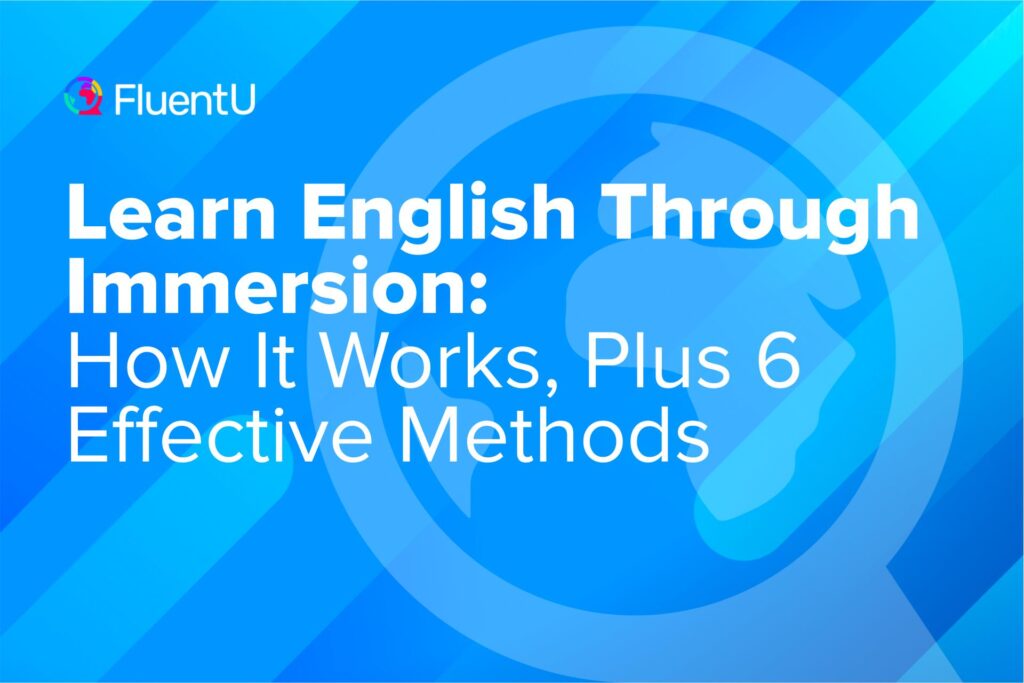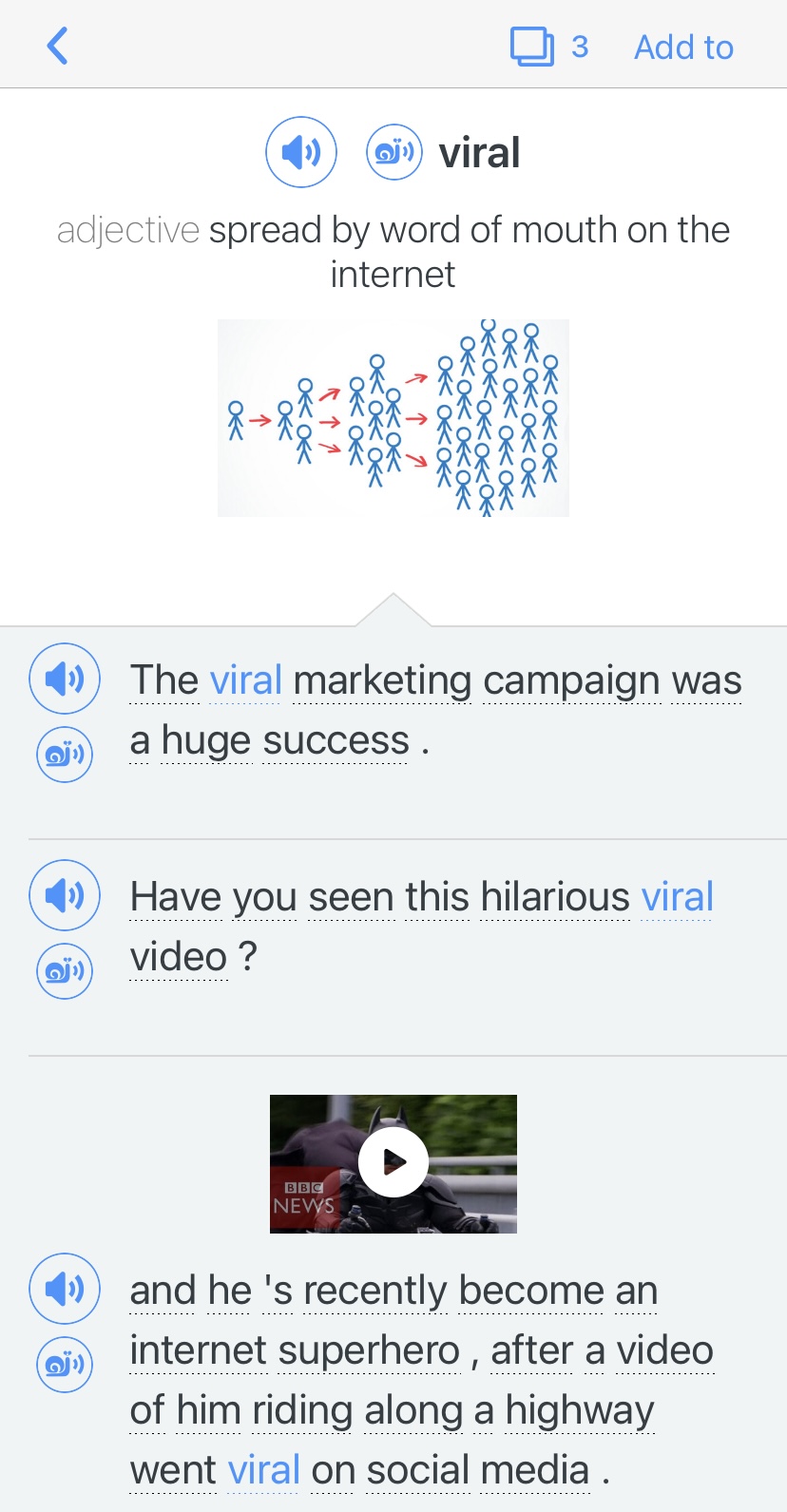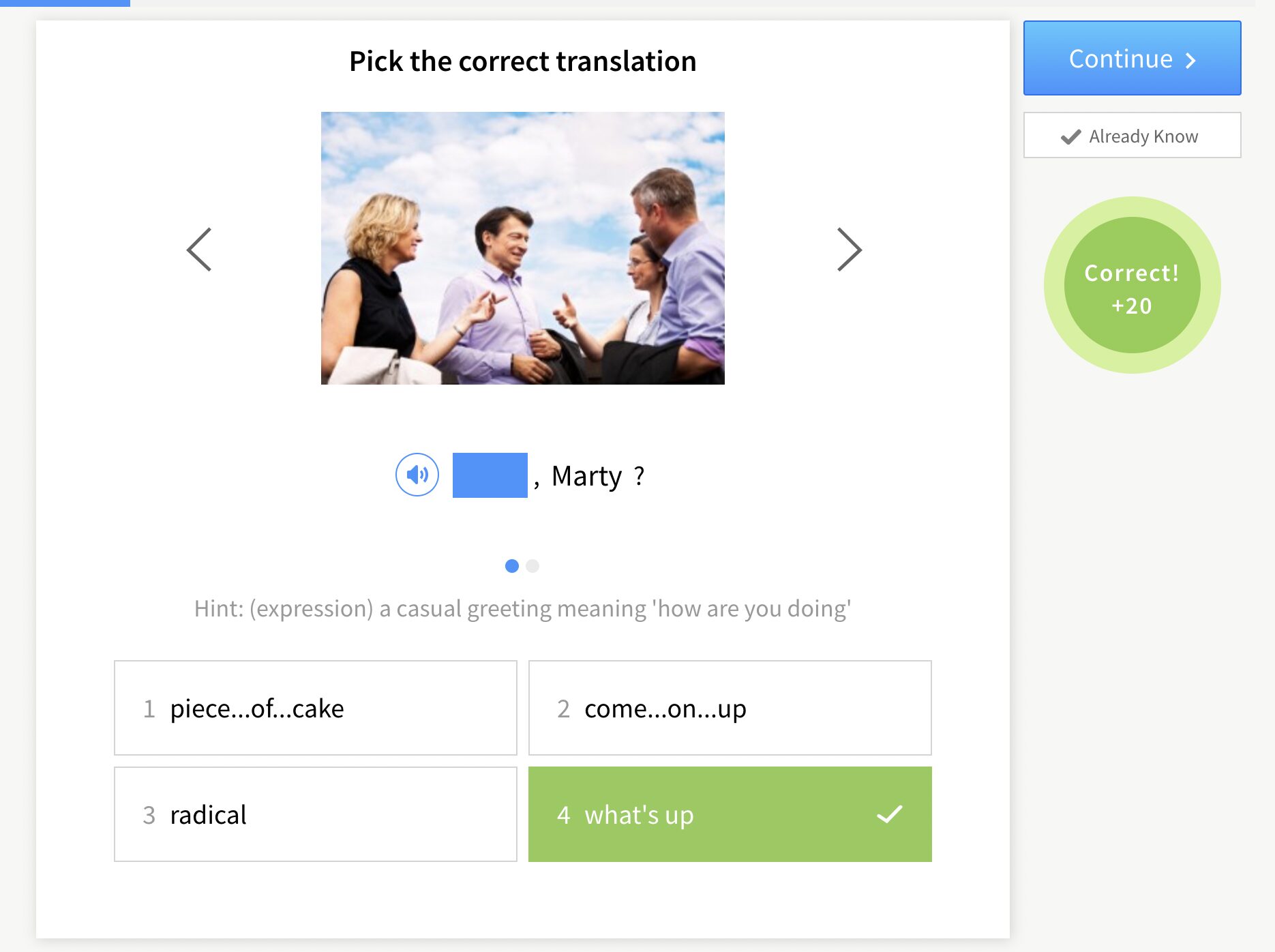Learn English Through Immersion: How It Works, Plus 6 Effective Methods

Immersion is a more natural way of learning a language.
In this post, we’re going to explore the many different ways to learn English through immersion. No matter what your English learning goals are, immersion can help you achieve them.
Contents
Download: This blog post is available as a convenient and portable PDF that you can take anywhere. Click here to get a copy. (Download)
Common Questions About Immersion
What Is Immersion?
Immersion is a way of joining the culture of the language that you’re learning. In the case of English, you could use immersion by watching English-language movies, reading English-language books and even eating food from English-speaking countries.
To go even further in immersion, you could move to an English-speaking country or an area where a lot of English speakers live. You would hear the language on a regular basis. This would help you to hear the language in the real world, giving you exposure (access and experience) beyond textbook exercises.
Do I Need to Go Anywhere?
Any language learner will tell you that they learn best when they use the language day and night. But is it really necessary for you to travel to another area if you want to learn through immersion?
Traveling can definitely help, but no, you don’t need to go anywhere. You can use immersion without ever leaving your native land.
The internet has made it possible for us to experience the world around us without leaving our desks. For example, if you have access to YouTube, you can search for movies, television shows and commercials from countries all over the world.
It’s not necessary to leave your home for immersion, but if you do have a chance to travel to an English-speaking country, don’t pass it up. Nothing helps you learn more than being around native English speakers. In this post, however, we’ll discuss ways you can immerse yourself in English no matter where you are.
Does It Cost Money?
It doesn’t have to. If you already have internet access, for example, you don’t have to pay anything extra to watch some English-speaking programs. You can use YouTube to find English-language movies, TV shows and videos.
We’ll give you several more options for free and affordable English immersion learning later in this article.
Who Can Benefit from Immersion?
Anyone who’s learning a language with the intention of speaking it one day can benefit from immersion. After all, you can’t expect to master any language without speaking and listening practice. Immersion also allows you to hear a language the way it’s actually spoken.
Why is this important? Well, textbooks are good for teaching you grammar and structure, but natives in different places often have their own unique vocabulary and pronunciations.
Even if you’re learning English as a requirement for school and work, immersion can still help. You may think that you won’t use English in everyday life, but immersion will give you a chance to see English in a new light. It will take it out of the classroom and let you see it as it’s used by real people, in real life.
6 Effective Ways to Learn English Through Immersion
Now that we know how great immersion is, what are some ways you can achieve it? Here are some ideas.
1. Take Cultural Field Trips

In your home country, look for English restaurants, stores and movies. If you live in a country where English is not the dominant (most popular) language, look to tourist areas (areas where you’ll find many travelers).
Hotels are often located near attractions that travelers like to visit. City centers or public squares will have many shops and places where travelers will be. English speakers love to travel, and many countries have dedicated areas where they meet.
Restaurants and stores in these areas will have Americanized food and products to make travelers more comfortable. Many of the staff in these restaurants and stores will know English. Visit these locations and practice ordering and asking about products in English.
If you’re feeling brave, approach some travelers and practice small talk in English.
In addition, some organizations, such as churches, may hold some meetings and services in English if there are a large number of English speakers in the area.
Check with local clubs and organizations to see if anything like this is available. By spending time at English-speaking events, you’ll challenge yourself to listen to your new language. You may even make some new English-speaking friends at the same time.
2. Plan Immersion Days
An immersion day goes one step beyond the cultural field trip. It’s an especially good option if there are no major English-speaking areas in your home country. You can immerse yourself without leaving your home.
Decide ahead of time that you’ll only listen to and speak in English for one full day. It will be uncomfortable, but at the end of the day, you’ll be happy that you accepted the challenge.
Here are some ideas for your immersion day:
- Start by getting a phrasebook in English. Any time you’re not sure what to say, go to your phrasebook.
Let your friends know that you’re practicing your English. If they’re practicing as well, you can have English conversations together. If they aren’t learning English, you may have no choice but to communicate with them in your native language, but try to also translate everything you say into English.
- Set up an extended practice session with a tutor (more on this in the next section).
- Choose some English movies and television shows, get some of your favorite snacks and have an English movie day.
- Prepare an English meal. A fun way to challenge yourself is to find English cooking lessons online on YouTube. Another good place to start would be PBS’s “The Great British Baking Show.”
3. Watch Authentic English Videos
Online videos (particularly YouTube) are taking the world by storm, and for good reason. They can show us and teach us new things from the comfort of home and for free.
So how can you utilize this for language learning?
Find English-language videos that not only teach you the language and culture.
For example, if you like sports, check out SPEAK, one of the best YouTube channels for following what’s going on in the American sports realm.
For learning something new, try Cole The Cornstar. His channel showcases the day-to-day challenges of farming and his clear Midwestern American accent is easy to understand.
You could also try our YouTube channel which bases language lessons on clips from our virtual immersion platform FluentU.
FluentU takes authentic videos—like music videos, movie trailers, news and inspiring talks—and turns them into personalized language learning lessons.
You can try FluentU for free for 2 weeks. Check out the website or download the iOS app or Android app.
P.S. Click here to take advantage of our current sale! (Expires at the end of this month.)

4. Find an Online Tutor for Conversation Practice
For immersing yourself in English through conversation, you may be able to get some extra help from your language teacher. You can also look for another tutor to give you extra time. This tutor will concentrate on helping you build your speaking and listening skills.
For the purposes of immersion, you need to find a tutor who will communicate with you in English from 75% to 100% of the time.
italki is a great resource to find a tutor for just about any language you want to learn. Informal tutors will talk to you in English, forcing you to use skills that you’ve learned.
italki and many other online sites will give you an advanced search option to find the right tutor. You can select a tutor that teaches the language you’re learning (English). You also have the option to select your tutor by availability, languages the tutor speaks, where they are from and rates.
You’ll get the best results by selecting a tutor who’s a native English speaker (you can also choose this in search options). If your tutor becomes impatient with your efforts, they aren’t right for you. You may need to go through a few tutors in order to find the best match for you.
Since online tutoring is done through platforms like Skype, you can have notes in front of you to help you speak during your tutoring sessions. The best thing about online tutors is that they often charge very little for time to talk to you in English. Since what you mainly want is a conversation partner, credentials (qualifications such as school or teaching experience) are not that important.
However, if you’re looking for a more qualified teacher to guide you along with conversation practice, Verbling specializes in helping you find exactly the right online tutor for you. You can look through hundreds of teachers from all over the world, and see how much they charge and what their availability is like. Even better, setting up meetings is simple—instead of planning a meeting on Skype, you can have tutoring sessions using Verbling’s own video technology.
5. Take an Immersion Class (or Combine Immersion with a Traditional Course)

Language Immersion vs. Traditional Language Courses
There are some formal immersion programs that charge a fee. The cost of these courses varies but they usually give you immersion combined with some kind of formal training. They’ll require you to use the language you’re studying.
Immersion programs differ from traditional online English courses in that they’re (mostly) instructed in the target language. Many regular ESL courses can also be considered immersive because they’re taught in English.
Some immersion programs take students on field trips to different areas so they spend time in the culture. They may give students jobs (either paid or volunteer) and provide room and board to help them actually live with the language they’re learning.
The best way to immerse yourself is to look for a course that’s 100% in English. This is the best way to challenge yourself and make yourself use the language.
We tend to go back to our native language when we’re uncomfortable. A course with a 100% English rule will force you to use the language more often than seems natural at first.
But even if your course is not 100% in English, you can still immerse yourself by studying English culture and entertainment on your own time. Your independent studies will help you in your traditional course because you’ll recognize things you’re learning outside of class. You’ll hear words and phrases the way they’re actually spoken, helping you to understand the language better.
Different Types of Formal Immersion Programs
Formal immersion programs are great if you can afford them. Since they combine formal instruction with immersion, they’ll cost some money. Many programs offer English immersion sections.
Some other programs, like Cornell University’s Summer College program, even offer college credit.
Other organizations, like Education First, have all kinds of different immersion options. You can travel to an English-speaking country and stay for a couple of weeks or a full year.
Many programs will give you formal language instruction with cultural lessons mixed in. The programs are in English, either partially or 100%. They’ll sometimes take you on field trips and set you up to work with native English speakers.
They help many language learners to pick up the language quickly, because they’re so intense.
Many formal ESL immersion programs also include a homestay option, which gives you a chance to live with an English-speaking family and experience the culture firsthand.
6. Spend Some Time Abroad

Many formal immersion programs are held abroad, but you can also travel to English-speaking areas without a formal program.
Here are some options to consider:
- One good program is Worldwide Opportunities on Organic Farms, or WWOOF, which allows you to volunteer in farms all around the world. In exchange for food and a place to stay, you work as a volunteer for farmers. You can choose English-speaking countries to practice your language skills with families, other workers and local people.
- Another good way to spend some time abroad is to work as a house sitter. A house sitter watches a house while the owners are away on vacation, business or for other reasons. You’ll stay in the home in exchange for maintenance (care and upkeep) of the home and/or property.
Websites such as TrustedHousesitters.com will allow you to create a listing as a house sitter and let those who need sitters find you. You can also apply to listed positions. Many of these jobs are in English-speaking countries.
- Many language learners enjoy Couchsurfing. You can meet people and stay anywhere in the world for little to no cost. You’ll meet new friends from all over the world and practice your English skills.
If you’re traveling on your own, you need to take responsibility for using your English regularly. Traveling to a foreign country can be a scary experience, and it’s easy to find others from your home country and stay with them in a kind of “bubble,” speaking your native language. That goes against your whole reason for traveling, though, right?
It’s okay to make friends from your home country, but don’t forget your reason for being abroad. Make sure you spend the majority of your time speaking and interacting with English speakers.
Why You Should Learn English Through Immersion

- You’ll have a chance to learn about another culture. Using immersion will help you learn about the culture of the language you’re studying.
English is a language with a wide variety of cultures. It would especially help to immerse yourself in the culture of the area where you expect to use your English. For example, if you plan on living in Australia, you can try watching Australian television and cooking Australian recipes.
It’s important to think about what English-language culture you want to immerse yourself in, because they can be quite different. For example, native English speakers from the United States have traveled to other English-speaking countries and had trouble communicating because of local differences. Picking up on new slang can be like learning a whole new language!
- You’ll overcome insecurities. Locals are often happy to see someone even attempt to learn their native language. It shows that you care about them enough to work to communicate with them.
We may think someone is laughing at our mistakes, but they are often eager to help. It can be hard to make mistakes, but immersion helps you learn to laugh at yourself and not take the language so seriously.
- You’ll exercise your mind and learn faster. It’s one thing to complete your English homework and go about the rest of your day. It’s another thing to completely devote your life to mastering the language.
A study reported by Psychology Today showed that children in second language immersion courses perform better than students who aren’t in those courses. This even goes beyond language skills. Students showed cognitive (thinking and reasoning) improvement.
The best way to master a second language is by using it. That’s what immersion will help you to do.
- You’ll learn like a native. Slang and spoken language are a big part of sounding natural when you speak. Language instructors often get strict about proper grammar, but most people don’t speak with perfect grammar all the time. English grammar is so complex that even native English speakers struggle with it, and they use English all day, every day!
By using immersion, you’ll learn the language like a child. No rules. No exercises.
You’ll just speak and hear the language in your everyday life. And you’ll become fluent. It won’t happen overnight, but learning comes with patience.
Immersion will force you to challenge yourself in your target language.
If you want to achieve mastery of English, you have to use the English language.
The only way you can do this is through some form of immersion, so use the ideas above to get started today!
Download: This blog post is available as a convenient and portable PDF that you can take anywhere. Click here to get a copy. (Download)
And One More Thing…
If you’re like me and prefer learning English on your own time, from the comfort of your smart device, I’ve got something you’ll love.
With FluentU’s Chrome Extension, you can turn any YouTube or Netflix video with subtitles into an interactive language lesson. That means you can learn from real-world content, just as native English speakers actually speak.
You can even import your favorite YouTube videos into your FluentU account. If you’re not sure where to start, check out our curated library of videos that are handpicked for beginners and intermediate learners, as you can see here:
FluentU brings native English videos within reach. With interactive captions, you can hover over any word to see an image, definition, and pronunciation.
Just click on the word to see other example sentences and videos where the word is used in different contexts. Plus, you can add it to your flashcards! For example, if I tap on the word "viral," this is what pops up:
Want to make sure you really remember what you've learned? We’ve got you covered. Practice and reinforce the vocab from each video with learn mode. Swipe to see more examples of the word you’re learning, and play mini-games with our dynamic flashcards.
The best part? FluentU tracks everything you’re learning and uses that to create a personalized experience just for you. You’ll get extra practice with tricky words and even be reminded when it’s time to review—so nothing slips through the cracks.
Start using the FluentU website on your computer or tablet or, better yet, download our from the App Store or Google Play.
Click here to take advantage of our current sale! (Expires at the end of this month.)












